
Boilers are vital appliances to keep your house warm and cozy, especially during the cold winter months.
That’s why frequent boiler failures may cause inconvenience in your daily lives. To prevent it, you must understand the underlying reasons for boiler failures.
Here are the seven most common causes of boiler failure every homeowner must know about to take timely preventive measures.
Let’s dive in.
1. Lack of Maintenance
Your boiler needs regular checkups to maintain its peak condition and work efficiently. As time goes on, the boiler can accumulate dirt, grim, and mineral deposits. It will negatively affect the boiler’s performance and cause a lot of problems.
Without proper care, the dirt and mineral accumulation can lead to heat loss and weak boiler operation. This can even lead to a complete boiler system failure.
To prevent it, you must hire a qualified technician or agency that excels in boiler repairs & installations at least once a year.
2. Thermostat Malfunction
A faulty thermostat that gives wrong temperature readings may lead to boiler failure.
For example, incorrect temperature reading may cause uneven heating, boiler temperature maintenance problems, and frequent cycling. As a result, the boiler will either overheat the water or not heat the water at all.
So, if your thermostat is outdated or shows inconsistent temperature readings, it’s time to change it.
3. Fluid Leaks
Fluid leaks can cause the pressure around your boiler to drop drastically. This can lead to complete heating system breakdown or degradation.
Corrosion, heat converters issues, or defective seals are the main reasons behind water leak issues. Only by detecting them early and fixing them on time can you prevent fluid leaks and boiler degradation.
4. Low Water Pressure
Low water pressure is yet another common reason for boiler failure in US and Canadian households. Low water pressure will prevent your boiler from sending hot water all over the system. This, in turn, may lead to decreased heating or no heating at all.
Keep an eye on your boiler for any sign of abnormality. You should also consult a qualified HVAC technician for regular checkups to avoid future troubles.
5. Boiler Pipes with Frozen Condensation
Water condensate pipes are an important part of the boiler system that drains the waste water from it. During the winter months, the water flowing through these pipes may freeze due to improper insulation. This will eventually result in critical boiler pipe blockage.
This kind of blockage will trigger the safety mechanism of your boiler, causing it to shut down to protect the system.
So, if you live in a place where the temperature drops below freezing point, you need to insulate the pipes to prevent boiler failure. Or you can install a trace heating system, which will help you achieve similar results.
6. Wear and Tear
Similar to any other HVAC or electrical appliance, your boiler will also wear out over time. When you use it long enough, its parts will start to corrode or wear out. Eventually, their working efficiency will drop, leading to frequent boiler failures.
To prevent boiler failures and prolong the components’ lifespan, you must make your boiler go through regular checkups. Eventually, you may even need to replace the worn-out parts to extend your boiler’s life.
However, even that can’t stop your boiler from completely wearing out. As the years pass, the old boiler will continue to show signs of failure. Eventually, it will stop working altogether.
When you reach this point, you should replace your old boiler with a new one. This will save money, reduce energy bills, and ensure smooth boiler operations.
7. Electrical Issues
Many operations of the boilers these days rely on various electrical parts. These operations include boiler ignition, communication, and temperature control.
So, when your boiler crashes, the main culprit may very well be one or more electrical issues. These issues included tripped circuit breakers, wiring damage, or PCB errors.
Make sure to have a qualified HVAC technician inspect the boiler’s electrical components regularly. This will help you prevent boiler failures due to electrical issues.
Final Words
As a homeowner, you must understand the main reasons for boiler failure to take proper preventive measures.
This will help you reduce the frequency of boiler failure. Plus, it will also prevent weather, thermostat errors, and other obvious issues from harming the boiler system.
With regular care and timely repairs, you can prolong your boiler’s lifespan.